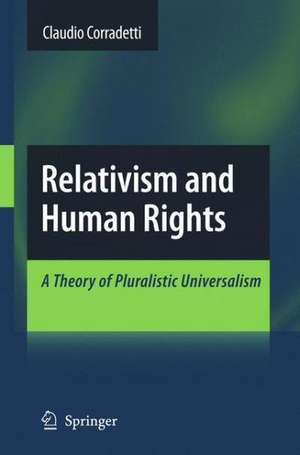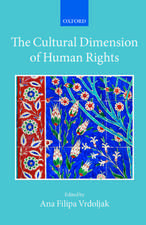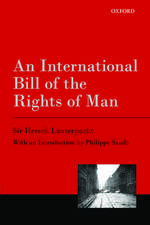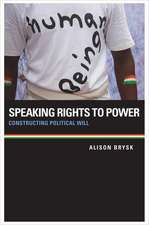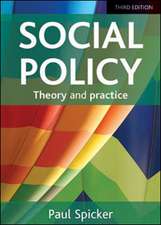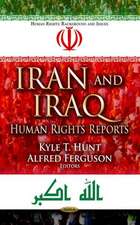Relativism and Human Rights: A Theory of Pluralistic Universalism
Autor Claudio Corradettien Limba Engleză Hardback – 27 apr 2009
| Toate formatele și edițiile | Preț | Express |
|---|---|---|
| Hardback (2) | 652.64 lei 6-8 săpt. | |
| SPRINGER NETHERLANDS – 8 noi 2021 | 652.64 lei 6-8 săpt. | |
| SPRINGER NETHERLANDS – 27 apr 2009 | 727.48 lei 6-8 săpt. |
Preț: 727.48 lei
Preț vechi: 887.18 lei
-18% Nou
Puncte Express: 1091
Preț estimativ în valută:
139.22€ • 143.82$ • 115.87£
139.22€ • 143.82$ • 115.87£
Carte tipărită la comandă
Livrare economică 26 martie-09 aprilie
Preluare comenzi: 021 569.72.76
Specificații
ISBN-13: 9781402099854
ISBN-10: 1402099851
Pagini: 170
Ilustrații: XVI, 170 p.
Dimensiuni: 155 x 235 x 13 mm
Greutate: 0.44 kg
Ediția:2009
Editura: SPRINGER NETHERLANDS
Colecția Springer
Locul publicării:Dordrecht, Netherlands
ISBN-10: 1402099851
Pagini: 170
Ilustrații: XVI, 170 p.
Dimensiuni: 155 x 235 x 13 mm
Greutate: 0.44 kg
Ediția:2009
Editura: SPRINGER NETHERLANDS
Colecția Springer
Locul publicării:Dordrecht, Netherlands
Public țintă
ResearchCuprins
I.- Cognitive Relativism and Experiential Rationality.- Beyond Moral Relativism and Objectivism.- II.- Human Rights and Pluralisitc Universalism.- The Legal Dimensions of Human Rights.
Recenzii
From the reviews:
“Claudio Corradetti’s book is a thoughtful attempt to find an adequate theoretical foundation for human rights. Its approach is interdisciplinary in nature, drawing on issues in analytical philosophy as well as contemporary political theorists, and the result is a densely argued text aimed at scholars … .” (Andrew Lambert, Metapsychology Online Reviews, Vol. 14 (3), January, 2010)
“Claudio Corradetti’s book is a thoughtful attempt to find an adequate theoretical foundation for human rights. Its approach is interdisciplinary in nature, drawing on issues in analytical philosophy as well as contemporary political theorists, and the result is a densely argued text aimed at scholars … .” (Andrew Lambert, Metapsychology Online Reviews, Vol. 14 (3), January, 2010)
Textul de pe ultima copertă
Can human rights principles admit degrees of contextual variations? Are our cultures condemned to a formally rigid standard of universalist hegemony? This work provides an innovative contribution to the legal-philosophical understanding of human rights theory. While advancing a post-metaphysical reconstruction for the notion of human rights, it defends an original perspective on the relation between universal validity and cultural pluralism. By rejecting the challenges of relativism and classical abstract universalism, this model reinterprets discursive theory in the light of dialectical recognition and judgmental exemplarity. The result is an enriched substantive notion of universalism oriented to the safeguard of situated authenticity. Pluralistic universalism considers that, while formal filtering criteria constitute unavoidable requirements for the production of potentially valid arguments, the exemplarity of judgmental activity, in its turn, provides a pluralistic and retrospective reinterpretation for the fixity of such criteria. While speech formal standards grounds the thinnest possible presuppositions we can make as humans, the discursive exemplarity of judgments defends a notion of validity which is both contextually dependent and "subjectively universal". According to this approach, human rights principles are embedded within our linguistic argumentative practice. It is precisely from the intersubjective and dialogical relation among speakers that we come to reflect upon those same conditions of validity of our arguments. Once translated into national and regional constitutional norms, the discursive validity of exemplar judgments postulates the philosophical necessity for an ideal of legal-constitutional pluralism, challenging all those attempts trying to frustrate both horizontal (state to state) and vertical (supra-national-state-social) on-going debates on human rights.
Caracteristici
Advances a post-metaphysical model for testing the validity of human rights Provides a grounded deliberative liberative model based upon the Kantian reflective judgment taking into account some of the most recent researches in the field of cognitive linguistics and ethics Specifically suited for academics and research scholars, but adoptable as a supplementary textbook for master’s and doctoral programmes A unique contemporary contribution to the understanding of the conceptual status of human rights principles An invaluable instrument also for the activities conducted at research centres and think-tanks
Descriere
Descriere de la o altă ediție sau format:
When he nished writing, he raised his eyes and looked at me. From that day I have thought about Doktor Pannwitz many times and in many ways. I have asked myself how he really functioned as a man; how he lled his time, outside of the Polymerization and the Indo- Germanic conscience; above all when I was once more a free man, I wanted to meet him again, not from a spirit of revenge, but merely from a personal curiosity about the human soul. Because that look was not one between two men; and if I had known how completely to explain the nature of that look, which came as if across the glass window of an aquarium between two beings who live in different worlds, I would also have explained the essence of the great insanity of the third Germany. PRIMO LEVI [If this is a man, pp. 111–112, in, If this is a man and The truce, trans. S. Woolf, Abacus, London, 1987] If all propositions, even the contingent ones, are resolved into identical propositions, are they not all necessary? My answer is: certainly not. For even if it is certain that what is more perfect is what will exist, the less perfect is nevertheless still possible. In propositions of fact, existence is involved. LEIBNIZ [Samtlic ¨ he schriften und briefe vol VI pt 4 Deutsche Akademie der Wissenschaften, 1449A VI 4] We live in a rule-constrained world.
When he nished writing, he raised his eyes and looked at me. From that day I have thought about Doktor Pannwitz many times and in many ways. I have asked myself how he really functioned as a man; how he lled his time, outside of the Polymerization and the Indo- Germanic conscience; above all when I was once more a free man, I wanted to meet him again, not from a spirit of revenge, but merely from a personal curiosity about the human soul. Because that look was not one between two men; and if I had known how completely to explain the nature of that look, which came as if across the glass window of an aquarium between two beings who live in different worlds, I would also have explained the essence of the great insanity of the third Germany. PRIMO LEVI [If this is a man, pp. 111–112, in, If this is a man and The truce, trans. S. Woolf, Abacus, London, 1987] If all propositions, even the contingent ones, are resolved into identical propositions, are they not all necessary? My answer is: certainly not. For even if it is certain that what is more perfect is what will exist, the less perfect is nevertheless still possible. In propositions of fact, existence is involved. LEIBNIZ [Samtlic ¨ he schriften und briefe vol VI pt 4 Deutsche Akademie der Wissenschaften, 1449A VI 4] We live in a rule-constrained world.
Notă biografică
Claudio Corradetti is Associate Professor of Political Philosophy at the University of Rome Tor Vergata. He has been an undergraduate student at Oxford University and at the University of London, where he has obtained a Ma Philosophy. Once back in Italy, he has gained a doctoral degree at LUISS Guido Carli, Roma. Claudio has been trained also in law, having obtained a Diploma in European Public Law and an admission to the advanced seminars in international public law at the Hague Academy. Among his teaching records, he has taught at the University of Oslo and at the University of Graz, Austria.
He is a founder and co-chief director of the journal ‘Jus Cogens. A Critical Journal of Philosophy of Law and Politics’, Springer. Claudio has published extensively in Human Rights, Transitional Justice, the Frankfurt School and Immanuel Kant for Oxford University Press, Routledge, Sage, Cambridge University Press etc.
He is a founder and co-chief director of the journal ‘Jus Cogens. A Critical Journal of Philosophy of Law and Politics’, Springer. Claudio has published extensively in Human Rights, Transitional Justice, the Frankfurt School and Immanuel Kant for Oxford University Press, Routledge, Sage, Cambridge University Press etc.
